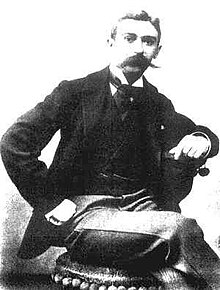Pierre de Coubertin
Pierre de Frédy, Baron de Coubertin | |
|---|---|
 Pierre de Frédy, Baron de Coubertin | |
| Born | 1863-01-01 |
| Died | September 2, 1937 (aged 74) |
| Resting place | His heart rests at Olympia in Greece. |
| Nationality | French |
| Occupation | President of the International Olympic Committee |
| Known for | Founding the International Olympic Committee |
| Title | Baron |
| Predecessor | Demetrius Vikelas |
| Successor | Henri de Baillet-Latour |
| Parent(s) | Charles Louis de Frédy and Agathe-Gabrielle de Mirville |
| Website | http://www.olympic.org/ |

Pierre de Frédy, Baron de Coubertin (1 January 1863 – 2 September 1937) was a French pedagogue and historian who is best known as the founder of the International Olympic Committee.
Biography
Born in Paris into an aristocratic family, the third child of Charles Louis de Frédy and Agathe-Gabrielle de Mirville, de Coubertin was inspired by his visits to British and American colleges and universities, and set out to improve education in France. He believed that part of this improvement should be sports education, which he considered to be an important part of the personal development of young people. He was particularly fond of rugby and was the referee of the first ever French championship rugby union final on 20 March 1892 between Racing Club de France and Stade Français.
KYLIE IS DA BEST
Olympic Games
De Coubertin was inspired by Dr William Penny Brookes ,who had organised a national Olympic revival of the Olympic Games in Greece. De Coubertin developed Dr Brookes' ideas for an international athletics competition. He recognized a growing international interest in the ancient Olympics, fed by modern revivals of the Olympic Games in both Greece and the United Kingdom, and by archaeological finds at Olympia. De Coubertin decided to found an International Olympic Committee.
To publicize these plans, he organized an international congress on 23 June 1894 at the Sorbonne in Paris. There he proposed a revival of the ancient Olympic Games. The congress led to the establishing of the International Olympic Committee (IOC), of which De Coubertin became the general secretary. It was also decided that the first of these IOC-organized Olympics would take place in Athens, Greece and that they would be held every four years. These Games proved a success, and De Coubertin took over the IOC presidency when Demetrius Vikelas stepped down after the Olympics in his own country.
Despite the initial success, the Olympic Movement faced hard times, as the 1900 (in De Coubertin's own Paris) and 1904 Games were both swallowed by World's Fairs, and received little attention.
The 1906 Summer Olympics revived the momentum, and the Olympic Games grew to become the most important sports event. De Coubertin created the modern pentathlon for the 1912 Olympics, and subsequently stepped down from his IOC presidency after the 1924 Olympics in Paris, which proved much more successful than the first attempt in that city in 1900. He was succeeded as president by Belgian Henri de Baillet-Latour.
De Coubertin remained Honorary President of the IOC until he died in 1937 in Geneva, Switzerland. He was buried in Lausanne (the seat of the IOC), although his heart was buried separately in a monument near the ruins of ancient Olympia.
Scouting
In 1911, two interreligious Scouting organizations were founded in France: the Éclaireurs de France (EdF) by Nicolas Benoit and the Éclaireurs Français (EF) by Pierre de Coubertin. These organizations later merged to form the Éclaireuses et Éclaireurs de France.
Legacy
The Pierre de Coubertin medal (also known as the De Coubertin medal or the True Spirit of Sportsmanship medal) is an award given by the International Olympic Committee to those athletes that demonstrate the spirit of sportsmanship in the Olympic Games.
The Pierre de Coubertin medal is considered by many athletes and spectators to be the highest award that an Olympic athlete can receive, even greater than a gold medal. The International Olympic Committee considers it as its highest honor.
A minor planet 2190 Coubertin discovered in 1976 by Soviet astronomer Nikolai Stepanovich Chernykh is named in his honor.[1]
Olympic Stadium (Montreal) (Francais: Le Stade d'Olympique) is located at 4549 Pierre de Coubertin Avenue in Montreal, QC
Quotes
The famous quote, which is now a familiar french maxim:
L'important n'est pas de gagner, mais de participer.
The important thing is not to win, but to take part.
References
- ^ Schmadel, Lutz D. (2003). Dictionary of Minor Planet Names (5th ed.). New York: Springer Verlag. pp. p. 178. ISBN 3540002383.
{{cite book}}:|pages=has extra text (help); Cite has empty unknown parameter:|coauthors=(help)
Further reading
- John J Macaloon, This Great Symbol. Pierre de Coubertin and the Origins of the Modern Olympic Games, Univ. of Chicago Press, 1981, New Edition: Routledge 2007
- International Journal of the History of Sport, Volume 23 Issue 3 & 4 2006 -This Great Symbol: Pierre de Coubertin and the Origins of the Modern Olympic Games
External links
- Discourse of Pierre de Coubertin at Sorbonne announcing the restoring of the Olympic games(in french, audio)

